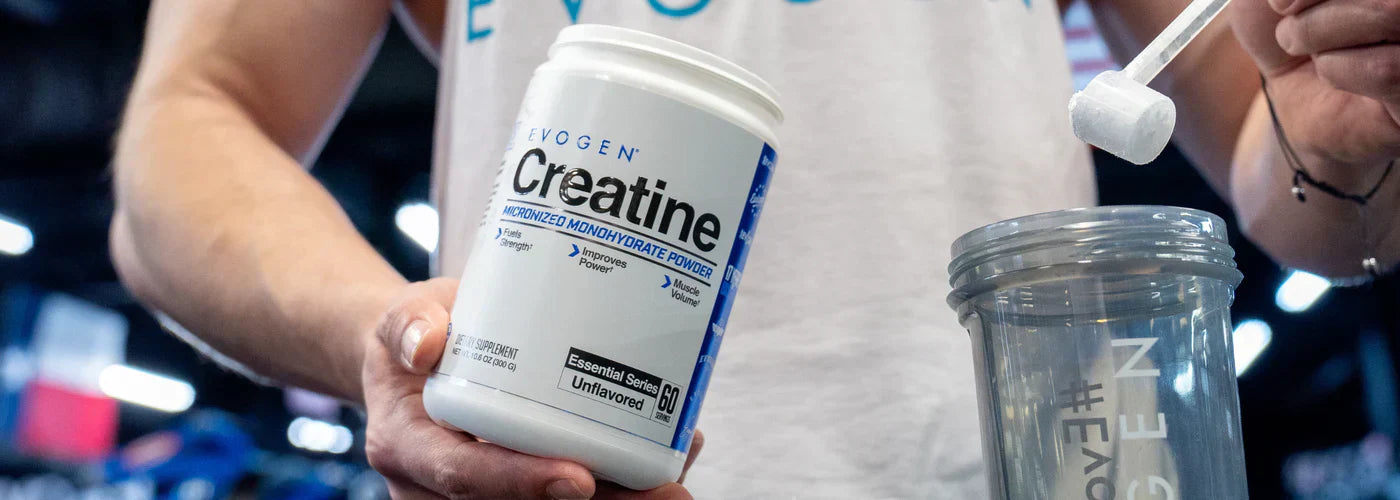Many people wonder: “Does creatine make you gain weight?” The short answer is: yes, but not in the way most people fear. The first kilos you see are water in your muscles, not fat. This extra water makes your muscles feel fuller and stronger and creates the ideal environment for muscle growth. In the long term, creatine also helps you add lean muscle mass, the kind of weight you really want.
How does creatine work in your body?
Creatine is a substance naturally found in your muscles. When you take a supplement, your body converts creatine into phosphocreatine, a quick energy source for intense workouts. This means you have more energy to lift heavier weights, do more reps, and recover faster. With the right training, this translates into strength and muscle growth.
Think of creatine as an extra battery for your muscles. It helps you train harder, go longer, and take your performance to the next level.
Benefits of creatine at a glance
- Increases ATP, the energy source of your muscles, for intense workouts
- Supports strength, endurance, and muscle growth
- Promotes recovery and protein synthesis
- Supports brain function and cognitive performance
- Works best in combination with consistent training and good hydration
Why you gain weight at first
Many people see an increase on the scale within the first week, usually 1–2 kg. This is completely normal and is due to water being drawn into the muscle cells. With a loading phase (20 g/day for 5–7 days) you notice this faster; with a maintenance dose of 3–5 g per day the change is gradual, but the long-term effect is the same. This extra water weight is not a problem, but a sign that creatine is doing what it’s supposed to do.
From water weight to muscle growth
Once your muscles are saturated and you train consistently, creatine goes beyond water weight. Within 4–8 weeks, users can gain on average 1–2 kg of lean muscle mass compared to people who do not take creatine. This is not “bulk” that sticks to you, but real muscle mass that improves performance and body composition.
This works because:
- The more weight you can lift, increasing progressive overload
- Creatine supports recovery and promotes protein synthesis
- Hydrated muscle cells create an anabolic environment for muscle growth
Hydration and electrolytes are essential
Because creatine draws water into your muscles, drinking enough fluids is important. Too little water can lead to fatigue, lethargy, or dizziness during workouts. Electrolytes such as sodium, potassium, magnesium, and calcium are also important to support muscle contractions and fluid balance. Well-hydrated muscles are not only bigger but also stronger and more resilient.
Dosage and timing
Most people need 3–5 g of creatine daily, heavier athletes sometimes 6–7 g. Consistency is key: it doesn’t matter if you take it in the morning, evening, before, or after training. Research suggests that intake after training combined with proteins and carbohydrates may slightly improve absorption.
Creatine and body composition
Creatine sometimes has the reputation of making muscles “puffy,” but that is a misconception. The water it draws into your muscles is intracellular, inside the muscle cells, where it promotes performance and recovery. This increased cell volume puts your body in a more anabolic state, which means better protein synthesis and more preservation of lean muscle mass. For those pursuing body transformation, creatine helps limit muscle loss during a calorie deficit and maintain focus on fat loss.
Safety and science
Creatine is one of the most researched supplements in sports nutrition. Decades of clinical studies show that it is safe for healthy adults and does not cause damage to kidneys or liver when used correctly. Moreover, creatine supports cognitive functions and may protect against neurological decline. It is therefore valuable for both athletes and anyone who wants to stay fit and sharp in the long term.
Who should avoid creatine?
Although creatine is safe for most people, certain groups should be cautious:
- People with kidney or liver problems
- Pregnant or breastfeeding women
- Teenagers, unless under professional supervision and correct dosing
Who is creatine suitable for?
Creatine is not just for powerlifters or Olympians. Anyone who wants to become fitter, stronger, or faster can benefit. It supports short, intense workouts, helps maintain muscle mass as you age, and can improve performance for anyone who is active.
The Takeaway: Water First, Lean Muscle Next
Creatine helps your muscles become stronger and bigger, recover faster, and perform better. The first kilos of water weight are a sign that your muscles are ready to grow, and in the long term, creatine helps you build lean muscle mass. With Evogen’s Creatine Monohydrate, you get a pure, effective, and scientifically supported formula that truly supports your performance and body transformation.



